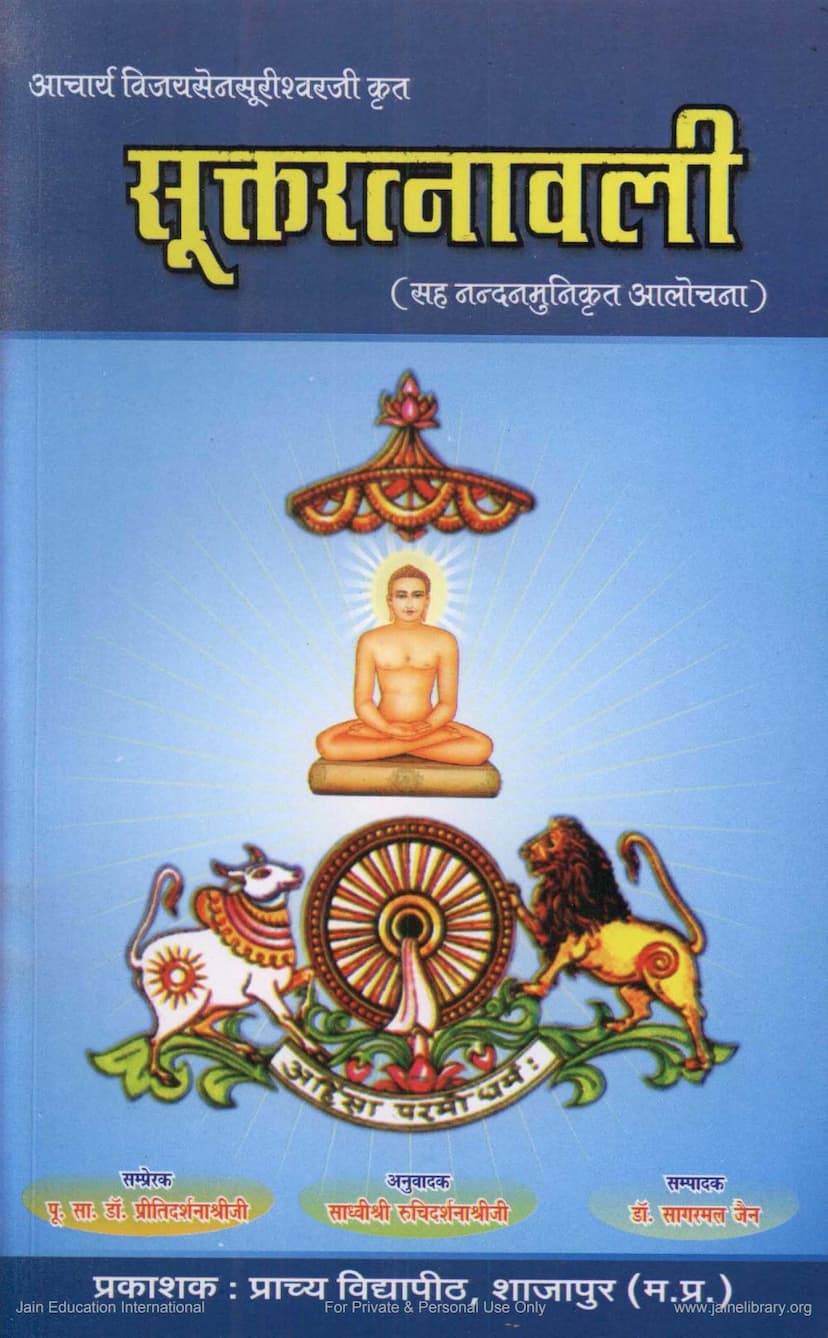Suktaratnavali
Added to library: September 2, 2025

Summary
This Jain text, "Suktaratnavali," authored by Acharya Vijay Sen Surishwarji, is a collection of insightful verses (suktas) that encapsulate profound truths of life. The book, published by Prachya Vidyapith Shajapur, features a commentary by Nandan Muni and was translated into Hindi by Sadhvi Shri Ruchidarshana Shri ji, with Dr. Sagarmal Jain as the editor.
The "Suktaratnavali" is presented as a guide for spiritual growth and mental peace, emphasizing the importance of self-study (swadhyaya) as a vital component of Jain spiritual practice. The text highlights that true liberation (moksha) in Jainism is liberation from attachment and aversion, and swadhyaya is a means to achieve this by purifying the mind and understanding oneself.
The introduction delves into the concept of swadhyaya, explaining its dual meaning: the study of the self and the study of virtuous literature. It asserts that true swadhyaya involves introspection, understanding one's own thoughts, desires, and emotions, and the study of scriptures that aid in overcoming inner impurities. The text draws parallels with the Bhagavad Gita, where Mahatma Gandhi found solace and solutions in its verses during difficult times.
The book details the five components of swadhyaya as described in Jain scriptures:
- Vachana (Reading/Studying): Learning from a Guru.
- Pratiprichhana (Questioning): Seeking clarification on doubts through questions and answers.
- Paravartana (Repetition): Reciting or reviewing previously studied material to strengthen memory and comprehension.
- Anupréksha (Contemplation): Reflecting deeply on the subject matter.
- Dharmakatha (Religious Discourse): Sharing the acquired knowledge with others or delivering sermons.
The text emphasizes that these stages follow a specific sequence, with Vachana being the primary step, followed by questioning, repetition, contemplation, and finally, the right to discourse.
The benefits of swadhyaya are extensively discussed, citing scriptures like the Uttaradhyayana Sutra and Brihatkalpa Bhashya. It is stated that swadhyaya helps in the decay of knowledge-obscuring karma, leading to right knowledge and the eradication of ignorance and delusion. The verses from the Uttaradhyayana Sutra are quoted to illustrate how swadhyaya facilitates the destruction of anger, pride, deceit, and greed, ultimately leading to liberation and eternal happiness.
The author, Acharya Vijay Sen Surishwarji, was a prominent Jain monk of the 16th-17th century, a disciple of Acharya Hirvijay Surishwarji. He was renowned for his intellectual prowess and his influence on Emperor Akbar. The book itself is noted for its concise verses, often of two lines each, which convey profound wisdom using simple yet impactful language and similes. The text includes over 500 such verses, offering insights into various aspects of life, morality, and spirituality.
The commentary by Nandan Muni offers a critical review and reflections on the verses, often rephrasing or elaborating on the core message. The accompanying "Nandan Muni Krit Alochana" (Critique by Nandan Muni) at the end of the book presents a form of self-reflection and penance, where Nandan Muni expresses remorse for any past transgressions related to violence, falsehood, greed, attachment, and improper conduct, seeking forgiveness and renouncing such actions. This section highlights the Jain emphasis on repentance and purification of the soul.
The introductory and concluding sections of the book also provide context about the institutions involved and the author, emphasizing the lineage of Jain acharyas and their contributions to literature and spiritual discourse. The text is a valuable resource for those seeking to understand Jain philosophy and practice, particularly the significance of self-study and virtuous living.